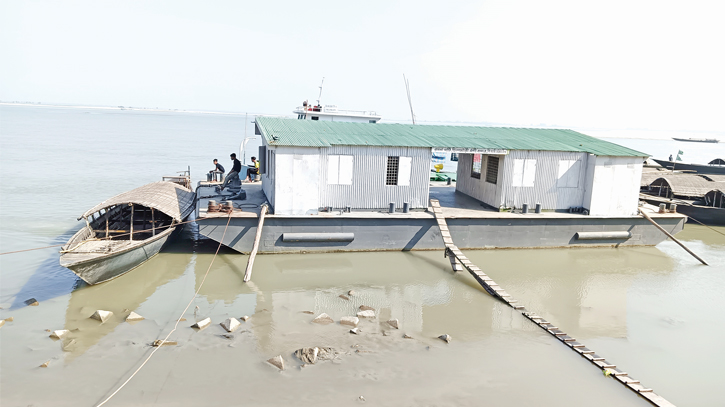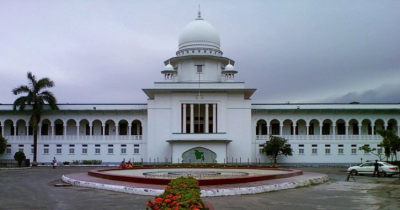
Due to the navigability crisis in the mighty Brahmaputra River, ferry and engine-driven boat services are disrupted. Photo: Messenger
The Brahmaputra River in Chilmari upazila of Kurigram is currently grappling with a severe navigability crisis, rendering it impassable and significantly impacting ferry and engine-driven boat services.
This has led to a situation where the river has essentially become a dead end, causing disruptions in transportation and livelihoods.
The local community is facing the brunt of this crisis, with a majority of people resorting to crossing the Brahmaputra River on foot. Residents from areas such as Ashtmir Char, Nayarhat, Karai Barisal, and Char are now compelled to compete for space in the Brahmaputra River for iri-boro cultivation, as the river's transformation into a small canal has disrupted traditional fishing and boating activities.
Over two hundred families, whose livelihoods depend on fishing and boating, are grappling with the closure of these essential activities due to the rise of char in the river. The once-mighty river has dwindled, forcing boatmen like Enta to navigate longer distances, resulting in increased time and fuel consumption. As a consequence, passenger numbers have dwindled, and the operation of almost all engine-driven vehicles is on the verge of cessation.
Farmers like Mahfuzar Rahman from Bajra Diyarkhata area highlight the impact of river erosion on their deposits and arable land. The drying up of the river necessitates irrigation for cultivation, incurring additional expenses for farmers already facing challenges. The adverse effects of climate change, such as drying up of the river in summer and monsoon-related floods and erosion, further compound the problems faced by the local population.
Local residents recall the promises made by Prime Minister Sheikh Hasina during the inauguration of a food-friendly program in Chilmari in 2016, expressing dissatisfaction with the lack of visible progress in addressing the navigability crisis. They emphasize the urgent need for dredging the river to alleviate their suffering and reduce farming costs by eliminating the need for irrigation.
Mamunur Rashmid, an associate professor, points out that climate change is exacerbating the river's issues, leading to its drying up in summer and causing floods and erosion during the monsoon. Failure to dredge the Brahmaputra River could result in the inundation of villages in Nayarhat Union and Pashvarti Union during the monsoon season.
The drying up of the Brahmaputra River is not only affecting the lifestyle of the local population but also impacting vegetation and agricultural production in the region. The cultivation of vegetables and other crops in the abdi lands of the grasslands is diminishing, prompting a call for urgent river dredging to address a myriad of issues, including the navigability crisis.
If prompt measures are not taken to repair the Brahmaputra River, the villages in the Char area of the upazila face an extreme threat during the monsoon season. Climate change threatens to eliminate navigability, leaving around 2000 families of boatmen unemployed and struggling for survival.
In response to these concerns, Mahbubur Rahman, the chief pilot of BIWTA, acknowledged a temporary navigability crisis but assured ongoing efforts to maintain a channel for ferry traffic. Dredging activities are underway, and authorities are optimistic about resolving the problem promptly.
Messenger/Fameema








